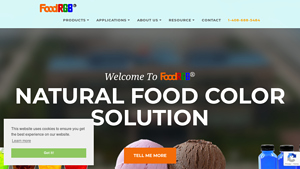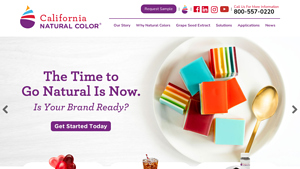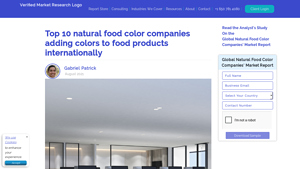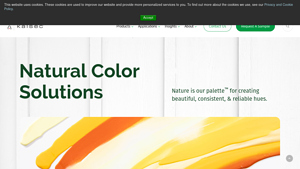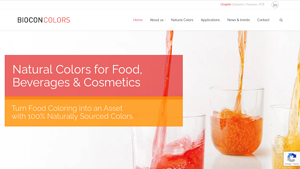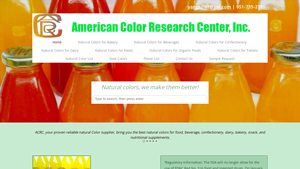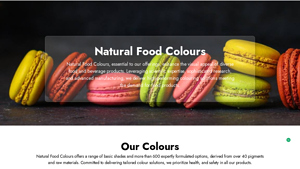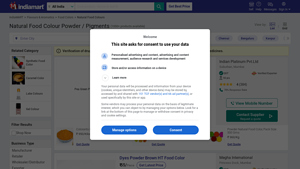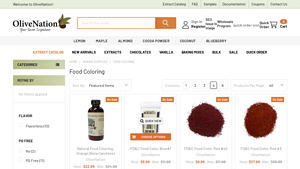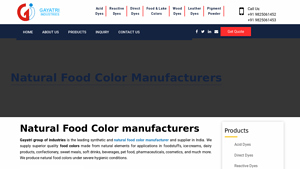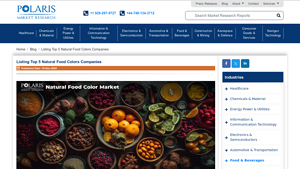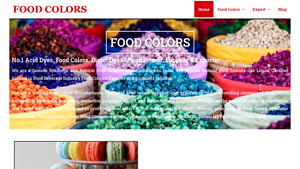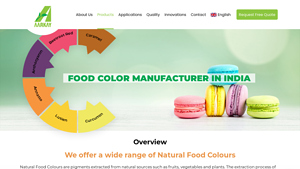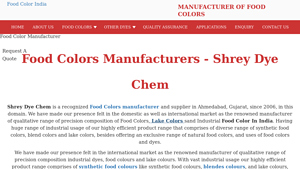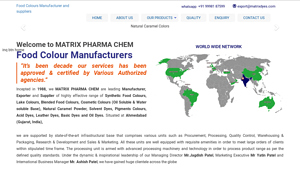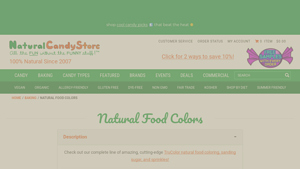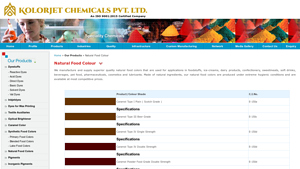Are you tired of sifting through countless suppliers, trying to find the perfect natural food color for your products? It’s a common challenge in the food industry, where quality and safety are paramount. Imagine the peace of mind knowing you’re sourcing from a top-tier manufacturer that not only meets but exceeds your standards. Choosing the right supplier can enhance your product’s appeal and ensure compliance with regulations.
In this article, we’ve curated a list of the top 30 natural food color suppliers, spotlighting their strengths, certifications, and product offerings. Whether you’re looking for vibrant hues or subtle shades, these manufacturers are ready to elevate your creations. Don’t miss out—dive in to discover the best suppliers that can transform your food products today!
Top 18 Natural Food Color Supplier Manufacturers
Food R G B – Natural Food Color Solutions
Domain: foodrgb.com
Registered: 2019 ( 6 years )
Introduction: Food R G B® offers 100% natural food color solutions, including natural food colorants and natural sweeteners, available in liquid and powdered forms.
California Natural Color – Plant-Based Color Solutions
Domain: californianaturalcolor.com
Registered: 2018 ( 7 years )
Introduction: California Natural Color offers naturally sourced liquid and crystal colors made from fruits, vegetables, and other plant-based sources for food, beverage, and nutraceutical applications.
Verified Market Research – Natural Food Color Insights
Domain: verifiedmarketresearch.com
Registered: 2018 ( 7 years )
Introduction: Information not available.
Kalsec – Natural Food Color Solutions
Domain: kalsec.com
Registered: 1996 ( 29 years )
Introduction: Kalsec offers a range of natural food color solutions including Vegetone® Natural Colors, Naturebrite® Colouring Foodstuffs, and Durabrite® High Stability Technology, which provide vibrant, stable hues derived from fruits and vegetables.
BioconColors – Natural Colorants for Food & Cosmetics
Domain: bioconcolors.com
Registered: 2016 ( 9 years )
Introduction: BioconColors specializes in producing natural colorants for the food, beverage, and cosmetic industries, offering tailored color solutions derived from natural raw materials.
Naturalfoodcolor – Plant-Based Natural Food Colors
Domain: naturalfoodcolor.com
Registered: 2011 ( 14 years )
Introduction: Natural colors for beverages, confectionery, tablets, bakery, snack foods, and dairy, all derived from plant origins and many are organic compliant.
Plant Lipids – Natural Food Colors & Ingredients
Domain: plantlipids.com
Registered: 2000 ( 25 years )
Introduction: Plant Lipids specializes in manufacturing water and oil soluble natural food colors, alongside a range of food, fragrance, and wellness ingredients.
Dir – Natural Food Colors and Solutions
Domain: dir.indiamart.com
Registered: 1996 ( 29 years )
Introduction: The company primarily offers a range of natural food colors in various forms such as powders and liquids, suitable for food and pharmaceutical applications.
Olivenation – Natural Plant-Based Food Colors
Domain: olivenation.com
Registered: 2007 ( 18 years )
Introduction: Natural and plant-based bulk food colors for baking and culinary applications.
Gayatridyesind – Natural Food Colors Manufacturer
Domain: gayatridyesind.com
Registered: 2019 ( 6 years )
Introduction: Gayatri group of industries is a leading manufacturer and supplier of natural food colors made from fruit and vegetable sources, suitable for various applications in food and beverages.
Polarismarketresearch – Natural Food Color Solutions
Domain: polarismarketresearch.com
Registered: 2017 ( 8 years )
Introduction: Natural food colors derived from fruits, vegetables, and other natural sources.
Foodcolors – Natural and Synthetic Food Color Solutions
Domain: foodcolors.org
Registered: 2014 ( 11 years )
Introduction: The company offers a wide range of synthetic and natural food colors, including Liquid Caramel Colors, Carmoisine Food Colors, Chocolate Brown HT Food Colors, and FD&C Food Colors. They provide customized solutions for various industries including foodstuffs, beverages, cosmetics, pharmaceuticals, and confectionery.
Aarkay Foods – Natural Food Colours Solutions
Domain: aarkayfoods.in
Registered: 2007 ( 18 years )
Introduction: Aarkay Foods offers a wide range of Natural Food Colours extracted from fruits, vegetables, and plants, available in both powder and liquid forms. These products are 100% vegetarian and are designed to enhance the visual appeal and consistency of food products.
Ifc Solutions – Natural Food Coloring Solutions
Domain: ifc-solutions.com
Registered: 2006 ( 19 years )
Introduction: Natural food coloring solutions for commercial use.
Foodcolorindia – Food Colors and Dyes Solutions
Domain: foodcolorindia.com
Registered: 2020 ( 5 years )
Introduction: Shrey Dye Chem manufactures and supplies a wide range of food colors including synthetic food colors, lake colors, blended food colors, and natural food colors. They also offer various types of dyes such as acid dyes and solvent dyes.
Matrix Pharma Chem – Food Colors and Dyes Solutions
Domain: matrixdyes.com
Registered: 2005 ( 20 years )
Introduction: Matrix Pharma Chem is a leading manufacturer, exporter, and supplier of a wide range of food colors and dyes, including Synthetic Food Colours, Lake Colours, Blended Food Colours, Cosmetic Colours, Natural Caramel Powder, Solvent Dyes, Pigment Colours, Acid Dyes, Leather Dyes, Basic Dyes, and Oil Dyes.
Natural Candy Store – Natural Food Color Solutions
Domain: naturalcandystore.com
Registered: 2005 ( 20 years )
Introduction: Natural Food Colors are vibrant and healthy options for coloring food products, made from natural sources.
Kolorjet Chemicals – Natural Food Color Solutions
Domain: kolorjetchemicals.com
Registered: 2007 ( 18 years )
Introduction: We manufacture and supply superior quality natural food colors made of natural ingredients for various applications in foodstuffs, pharmaceuticals, cosmetics, and lubricants.
Category Information
Natural food color suppliers play a crucial role in the food and beverage industry by providing colorants derived from natural sources, such as plants, fruits, and vegetables. Unlike synthetic dyes, natural food colors are perceived as safer and healthier alternatives, aligning with consumer demand for clean-label products. These colors are used to enhance the visual appeal of food items, influencing consumer perception and purchasing decisions.
The significance of natural food color suppliers extends beyond aesthetics; they contribute to the overall market trend towards sustainable and environmentally-friendly practices. With increasing awareness of health and wellness, manufacturers are increasingly seeking natural alternatives to synthetic additives. This shift not only supports consumer preferences but also promotes the use of renewable resources, making natural food color suppliers integral to the evolving landscape of the food industry.
Application Information
Natural food color suppliers play a vital role in several industries by providing plant-based and mineral-derived colorants that enhance the visual appeal of food products. One key application area is the food and beverage industry, where natural colors are used in items like candies, beverages, and dairy products to attract consumers and improve marketability without synthetic additives.
Another significant area is cosmetics and personal care, where natural colors are incorporated into products such as lipsticks, creams, and soaps, catering to the growing demand for clean beauty solutions. Additionally, the nutraceuticals sector utilizes natural colors to enhance the appearance of dietary supplements, making them more appealing to health-conscious consumers. These applications reflect the increasing preference for natural ingredients across various markets, driven by consumer awareness and regulatory considerations.
Production Process Information
The production process for natural food colors involves several key steps, starting with sourcing raw materials. Suppliers typically use fruits, vegetables, and plants to extract vibrant colors. This initial stage requires careful selection of high-quality ingredients to ensure the best color extraction. Next, the extraction process takes place. This can involve techniques like pressing, boiling, or using solvents to obtain the natural pigments. Once extracted, the colors are purified and concentrated to enhance their effectiveness in food products.
After purification, the natural colors undergo quality testing to ensure they meet safety and regulatory standards. Finally, the colors are packaged and distributed to food manufacturers, who incorporate them into their products. Throughout the process, considerations such as sustainability, shelf life, and consumer preferences for clean-label ingredients play a crucial role in developing appealing natural food color options.
Related Video
Frequently Asked Questions (FAQs)
What should I look for in a natural food color supplier?
When searching for a natural food color supplier, consider factors like product quality, certifications, and sourcing practices. Look for suppliers that have certifications such as USDA Organic or Non-GMO Project Verified, as these indicate a commitment to quality and sustainability. It’s also important to check their production processes and whether they can provide transparency about the sourcing of their raw materials. Additionally, customer service and responsiveness are key, as you want a supplier who is easy to communicate with and can address your needs promptly.
How can I verify the quality of natural food colors?
To verify the quality of natural food colors, request samples from potential suppliers and conduct your own testing. Look for information on their testing methods and quality control processes. A reputable supplier should be able to provide you with detailed documentation, including Certificates of Analysis (COA) for their products. These documents should outline the composition, purity, and any contaminants present in the food colors. You can also seek third-party testing results to ensure that the products meet your quality standards.
Are there minimum order quantities I should be aware of?
Yes, many natural food color suppliers have minimum order quantities (MOQs) that you need to consider. MOQs can vary widely depending on the supplier and the specific product. Some suppliers may require a small MOQ for trial orders, while others may have higher thresholds for bulk purchases. It’s a good idea to discuss your needs with potential suppliers upfront to find one that aligns with your purchasing capacity. If you’re just starting out, look for suppliers that are flexible with MOQs or offer sample sizes.
What are the common types of natural food colors available?
Natural food colors come in various forms, including powders, liquids, and gels. Common sources for these colors include fruits, vegetables, spices, and herbs. For example, beet juice is often used for red, turmeric for yellow, and spirulina for blue-green hues. When choosing a supplier, consider the types of colors you need for your products and whether the supplier offers a comprehensive range. It’s also helpful to inquire about the stability and heat resistance of the colors, especially if you’re using them in processed foods.
How can I ensure that my supplier is environmentally responsible?
To ensure that your natural food color supplier is environmentally responsible, look for certifications that indicate sustainable practices, such as Fair Trade or Rainforest Alliance. Ask about their sourcing methods and whether they prioritize organic and locally-sourced ingredients. Additionally, inquire about their waste management and energy use during production. A responsible supplier should be open about their environmental policies and practices, so don’t hesitate to ask for this information during your discussions. This will help you partner with a supplier that aligns with your values and commitment to sustainability.

